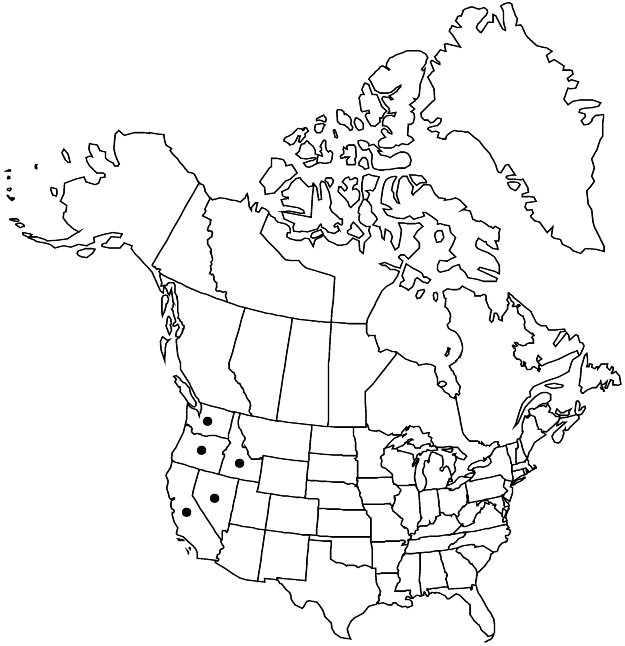Difference between revisions of "Eriogonum elatum"
Trans. Linn. Soc. London 17: 413. 1836.
FNA>Volume Importer |
RevisionBot (talk | contribs) m (Bot: Adding category Revised Since Print) |
||
| (3 intermediate revisions by 3 users not shown) | |||
| Line 6: | Line 6: | ||
|place=17: 413. 1836 | |place=17: 413. 1836 | ||
|year=1836 | |year=1836 | ||
| + | }} | ||
| + | |special_status={{Treatment/ID/Special_status | ||
| + | |code=E | ||
| + | |label=Endemic | ||
}} | }} | ||
|basionyms= | |basionyms= | ||
| Line 19: | Line 23: | ||
-->{{Treatment/Body | -->{{Treatment/Body | ||
| − | |distribution= | + | |distribution=Calif.;Idaho;Nev.;Oreg.;Wash. |
|discussion=<p>Varieties 2 (2 in the flora).</p><!-- | |discussion=<p>Varieties 2 (2 in the flora).</p><!-- | ||
--><p><i>Eriogonum elatum</i> is widely distributed but rather scattered throughout its range. The plants are occasionally seen in the garden. Inflorescence branches were chewed or made into an infusion and taken as a physic by some Native American people (D. E. Moerman 1986).</p> | --><p><i>Eriogonum elatum</i> is widely distributed but rather scattered throughout its range. The plants are occasionally seen in the garden. Inflorescence branches were chewed or made into an infusion and taken as a physic by some Native American people (D. E. Moerman 1986).</p> | ||
| Line 50: | Line 54: | ||
|basionyms= | |basionyms= | ||
|family=Polygonaceae | |family=Polygonaceae | ||
| − | |distribution= | + | |distribution=Calif.;Idaho;Nev.;Oreg.;Wash. |
|reference=None | |reference=None | ||
|publication title=Trans. Linn. Soc. London | |publication title=Trans. Linn. Soc. London | ||
|publication year=1836 | |publication year=1836 | ||
| − | |special status= | + | |special status=Endemic |
| − | |source xml=https:// | + | |source xml=https://bitbucket.org/aafc-mbb/fna-data-curation/src/2e0870ddd59836b60bcf96646a41e87ea5a5943a/coarse_grained_fna_xml/V5/V5_634.xml |
|subfamily=Polygonaceae subfam. Eriogonoideae | |subfamily=Polygonaceae subfam. Eriogonoideae | ||
|genus=Eriogonum | |genus=Eriogonum | ||
| Line 62: | Line 66: | ||
}}<!-- | }}<!-- | ||
| − | -->[[Category:Treatment]][[Category:Eriogonum subg. Eucycla]] | + | --> |
| + | |||
| + | [[Category:Treatment]] | ||
| + | [[Category:Eriogonum subg. Eucycla]] | ||
| + | [[Category:Revised Since Print]] | ||
Latest revision as of 17:05, 6 November 2020
Herbs, erect, not scapose, 4–8(–15) × 1–4 dm, glabrous or villous. Stems erect, without persistent leaf bases, up to 1/5 height of plant; caudex stems absent; aerial flowering stems erect, slender to stout, solid or hollow, infrequently fistulose, 1.5–4(–8) dm, glabrous, tomen-tose, or villous. Leaves basal; petiole 5–25 cm, villous; blade lanceolate to lance-ovate, 4–15(–25) × 1.5–6 cm, loosely villous and green on both surfaces or infrequently thinly tomentose abaxially and glabrate adaxially, margins plane. Inflorescences cymose, 15–50 × 10–30 cm; branches glabrous or villous; bracts 3, semileaflike, linear, and 5–30 × 2–5 mm proximally, scalelike, triangular, and 1–4 mm distally. Peduncles absent or slender, erect, 0.5–4 cm, glabrous or tomentose. Involucres 1 per node or 2–5 per cluster, turbinate, (2.5–)3–4 × 2.5–3 mm, glabrous or slightly tomentose; teeth 5, erect, 0.4–0.9 mm. Flowers 2.5–4 mm, glabrous; perianth white; tepals connate proximal 1/4, monomorphic, obovate; stamens exserted, 2.5–4 mm; filaments pilose proximally. Achenes light brown, 3.5–4 mm, glabrous.
Distribution

Calif., Idaho, Nev., Oreg., Wash.
Discussion
Varieties 2 (2 in the flora).
Eriogonum elatum is widely distributed but rather scattered throughout its range. The plants are occasionally seen in the garden. Inflorescence branches were chewed or made into an infusion and taken as a physic by some Native American people (D. E. Moerman 1986).
Selected References
None.
Key
| 1 | Flowering stems and inflorescence branches gla- brous | Eriogonum elatum var. elatum |
| 1 | Flowering stems and inflorescence branches villous | Eriogonum elatum var. villosum |